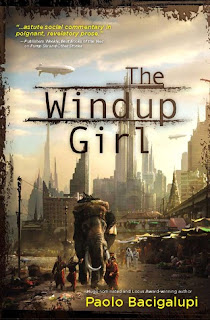The Windup Girl by Paolo Bacigalupi (2009)
In the far future, blights and illness have ravaged the world and wiped out food sources. A couple of huge calorie companies such as AgriGen produce genetically modified foods on which people depend, and wield enormous power. In Thailand, Anderson Lake runs a kink-spring factory, a cover for his real job of seeking out foods thought to have vanished. He crosses paths with another rarity : a windup girl named Emiko, an engineered New Person from Japan, illegal in Thailand.
For most of the book, I had no idea what was going on. But one of the reviewers on Goodreads claimed the same experience and still liked the book so I persevered though I had been very close to just putting it down. By the time I finished, it made more sense and I immediately turned back to the beginning and read the first chapter again. I don't think this was the author's fault - I'm just a little dense with certain kinds of plots. (I once read half of Tinker, Tailor, Soldier, Spy and had no idea what was going on, then watched the entire movie and was still mystified.)
A frequently complained about shortcoming in science fiction is the info dump, in which something is explained very thoroughly, breaking up the narrative flow. The Windup Girl went the opposite direction and explained nothing. A smarter person probably could have figured out enough from the context, but I have long thought that I'm not smart enough to read science fiction and this may have confirmed it. Even more difficult, much of what I didn't understand were the companies and government agencies Anderson Lake and other characters were involved with - even in the real world I'm confused by bureaucracy and organizations.
Make no mistake though, the writing is really good. I could picture it all like a movie (which I hope it will be someday) and considering that most of the reason I read this was for the setting, in that I was quite satisfied. Bacigalupi crafted realistic descriptions of the markets, factories, Megadonts (genetically engineered elephants used to power the factories), kink-springs, algae baths, and various other aspects of the world he created. The plot was well-developed, with surprises such as a minor character coming to the forefront late in the novel, and it is a frighteningly possible future - I mean, AgriGen is basically Monsanto.
Where it really fell short for me was the characters. I think it's fairly common in science fiction that characters aren't fleshed out, but unfortunately my tastes are for well-developed characters. Emiko, the windup, was pretty good, as was Anderson Lake's assistant Hock Seng, but I felt like I knew nothing about Lake or a few other male characters who were all fairly interchangeable in my head. Part of the problem was that it switched between so many characters without developing them much, and they were kept rather distant emotionally so it was difficult to care about them.
I think this really is quite a good novel, and my enjoyment of it was lessened only by my own limitations. Had I understood more I'm sure I would have liked it better, though I find myself liking it more the more I think about it and the more reviews I read. Maybe it's just a style that one has to get used to and I should read more science fiction to get better at it. What do you think?

No comments:
Post a Comment